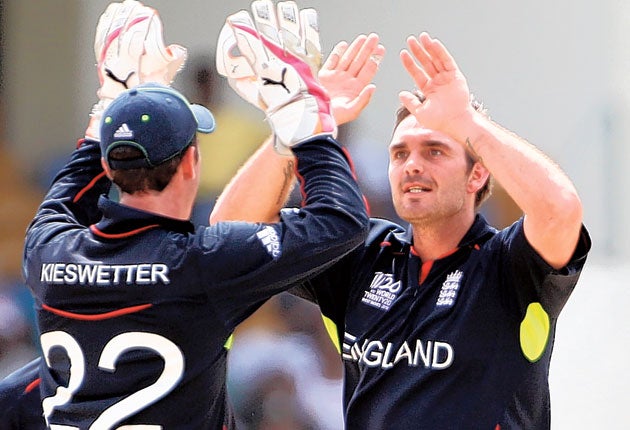Selectors turn to Kieswetter and Lumb for opening salvo
England's 16th first-wicket pair in Twenty20 will hold the key on slow pitches, writes Stephen Brenkley

For once, England have travelled in confident expectation rather than desperate hope. Or that is the claim being made for their attempt to win their first world tournament after 34 barren years, still the only major nation to be unrewarded.
With such a miserable record spread over nine World Cups, six Champions Trophies and two World Twenty20s they probably have no option but to cite confidence. In the past few weeks since their squad was picked the suggestion, growing into an assertion, has been made that the selectors, bless 'em, have at last designed with skill and attention to detail a combination to take on the planet and beat it. Players who have never taken part before in an international Twenty20 have suddenly been put forward as the answer to prayers which have been, by and large, resolutely ignored since 1975.
This mood of rampant optimism has certainly not diminished in the last few days since arriving in the Caribbean and indeed has burgeoned after two efficient and composed victories in warm-up matches against Bangladesh and South Africa. Against the fitful West Indies tomorrow and an increasingly lacklustre Ireland on Tuesday it will be time to begin finding out if any of it makes sense.
England should qualify straightforwardly for the Super Eights section of the tournament. If West Indies should beat them – as they did in the World Twenty20 last summer, a defeat which eliminated England – then they should be too strong and smart for Ireland. The tougher games will come later in the week against Pakistan, South Africa and New Zealand. If there is an upside, it is that they have avoided India, Sri Lanka and Australia at least until the semi-finals. The draw was made months ago based on results until that point.
Anybody is capable of winning this competition, such is the nature of Twenty20 cricket. But it is still difficult to feel that anybody includes England. History has something to do with it, for sure, but there are other unknown quantities. The biggest of these concerns the likely opening partnership of Michael Lumb and Craig Kieswetter, South Africans both (with a compatriot, Kevin Pietersen, going in at three). Neither has been capped at Twenty20 level before and Kieswetter's experience has been limited to three one-day internationals against Bangladesh three months ago, in the last of which he made a hundred.
It is unimaginable that England would go into, say, an Ashes series or a 50-over World Cup with an untried opening pair (it will, incidentally, be the 16th pair they have used in 26 Twenty20 matches, which hardly augurs well for their durability). Yet the selectors and team management are asking the world to believe that Lumb and Kieswetter, hard hitters both, at last provide an answer.
Kiewsetter is 22 and clearly gifted, and though his wicketkeeping is not the cleanest, he took an extremely astute leg-side catch standing up in one of the warm-up matches. But it is still asking much for him to perform adequately in this kind of competition and his form for Somerset in the opening weeks of this summer has been poor (25 runs in four innings).
As for Lumb, he is 30 and has been around for nine years since he came from Johannesburg to reclaim his heritage. In that time he has been a steady player, no more, and after 133 matches he has taken his batting average to 33. Of world superstardom it does not speak. But he does, as they say, hit a hard ball, had a successful Twenty20 domestic competition for Hampshire last year and was the 24th leading scorer in the recent Indian Premier League in which he played for Rajasthan Royals, scoring one fifty. If this pair fall short, England will be up against it because the first six overs on the slow pitches likely to be constantly paraded are thought to be vital.
The middle order looks genuinely strong. Pietersen has found his mojo apparently, though he may have to leave at any moment to be at the side of his wife, Jessica, who is about to give birth to their first child. Paul Collingwood, the captain, showed in the IPL that he is one of the most adaptable players around. He recognises his limitations and makes the most of them.
On sturdier pitches, Eoin Morgan would have a chance of being one of the players of the tournament. As it is, his wonderfully innovative strokes and clever assessment of when to play them are likely to prove crucial. Why Morgan is not a serious contender for Test cricket – defensive strategy, dealing with attacking fields – is an argument for another day, but he has it in him to become one of the most influential of all one-day batsmen.
On Tuesday, of course, Morgan will play against Ireland, for whom he played 22 one-day internationals before he felt he had to defect to England. There will be no sentimentality about the occasion.
England will also rely on Mike Yardy to bowl his left-arm spin. It has come to something when such a player can be expected to dictate the course of events, firing it in, stifling the batsmen. But he has learned to be canny; twice in warm-up matches he saw batsmen about to charge him, changed his length accordingly and was rewarded with wickets.
There may be a conundrum about whether to play Ryan Sidebottom, who looks to be in better form than Stuart Broad. After this week there will be more evidence but with the present available information, England do not have the feel of winners.
Join our commenting forum
Join thought-provoking conversations, follow other Independent readers and see their replies
Comments
Bookmark popover
Removed from bookmarks